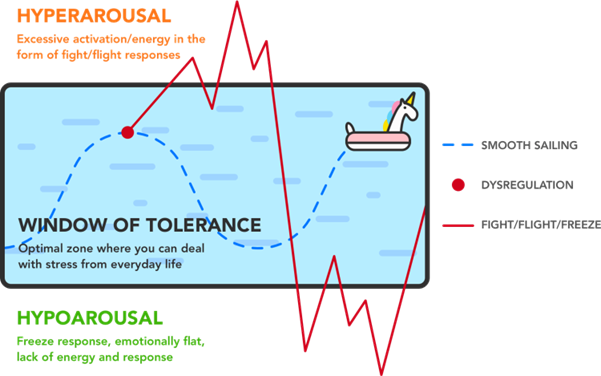Emotional regulation skills
Emotional regulation skills
One of the challenges of adulting is that we’re expected to be able to manage our own emotions in a manner that is considered socially acceptable. Sometimes that is really hard, especially when we’re trying to navigate really big emotions like anxiety and anger, or in the midst of really triggering environments or situations. When our emotion-management system fails we might say or do things that we later regret, and the outcome might be damage to personal relationships or affect how we’re perceived in a professional (workplace) capacity. Over time, if we don’t work at improving our emotional regulation skills it can negatively impact our personal wellbeing and social relationships.
Simply put, emotional regulation is the ability to exert control over our own emotional state. It can involve behaviours like reframing a challenging situation to reduce anger or anxiety, hiding visible signs or sadness or fear, or refocusing our attention on more pleasant or comfortable feelings. It can also involve working with our physiological state in order to regulate the big emotions that are flowing from that dysregulation. It’s not always about ‘down-regulation’ or reducing intense emotions. Some people need support to ‘up-regulate’ their emotions. For example, people who often feel numb might needs help to learn when a healthy dose of anxious energy or excitement is appropriate.
Window of Tolerance:
This model of understanding what is happening with emotional regulation is such a simple but effective way to make sense of all this. The window of tolerance is the zone where big emotions can be processed in a healthy way, allowing us to function and react to stress, anxiety, and fear effectively. It’s the comfort-zone where we have the ability to self-soothe and self-regulate. When we’ve experienced trauma though our window of tolerance can get adversely affected, and so we can find our body responding defensively when we don’t need or want it to, causing us to leave our window of tolerance and the end result is some form of emotional dysregulation.
There are two states of dysregulation:
- Hyperarousal – too much energy or excessive activation. This is when fight/flight happens, and we usually experience emotions like anxiety, panic, fear, hypervigilance, or anger.
- Hypoarousal – the opposite of hyperarousal and looks like a freeze response where we might feel numb, without feelings, lack of energy, inability to act, think ore respond, shame.
We want to aim to hang out on that ‘smooth sailing’ path above – bobbing along with our emotions riding our very own unicorn inflatable! Over the next few weeks, we’ll spend more time exploring how we can work with our window of tolerance, and emotional regulation but for now, just spend some time becoming aware of what it feels like for you when you’re inside your window of tolerance, and when you’re not – it’s a pretty enlightening exercise.
One last thing to know is that it’s a lot easier to stay within our window of tolerance if some of our basic biological and physiological needs have been met – it’s much harder to regulate our emotions if we’re hungry, tired or even need the toilet. Simple things to consider, but I promise they can make a really big difference!
If you’d like to explore your own emotional regulation skills and would like a safe space to talk about your mental health, please get in touch with us: www.theabaker.com.au / hello@theabaker.com.au / 03 9077 8194.


